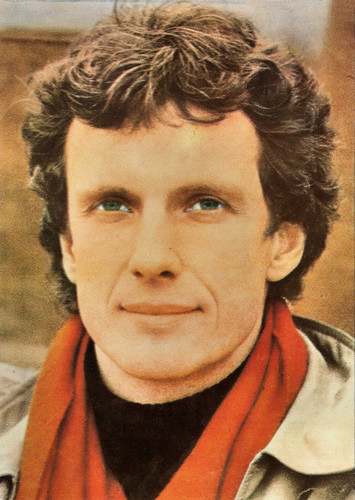
Romanian postcard by Casa Filmului Acin.
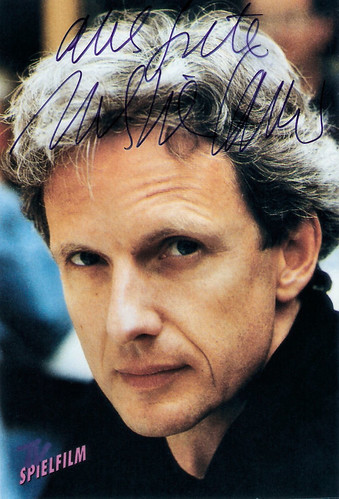
German autograph card by TV Spielfilm.
Der junge Törless
Mathieu Carrière was born in 1950 in Hanover, Germany. His parents were Bern Carrière, a neurologist and psychiatrist, and Jutta Carrière. His brother Till Carrière and sister Mareike Carrière would both become actors too.
Carrière grew up in Berlin and Lübeck. The young Mathieu had his first stage role as Emil in a school stage production of Erich Kästner's 'Emil und die Detektive' (Emil and the Detectives) at the Gymnasium Katharineum in Lübeck. At the age of 13, he played the young Tonio in the film adaptation of Thomas Mann's Tonio Kröger (Rolf Thiele, 1964), with Jean-Claude Brialy as the adult Tonio.
Mathieu attended the Jesuit boarding school Lycée Saint-François-Xavier in Vannes, France. This school had previously been attended by the director of Carrière's next film, Volker Schlöndorff. Carrière played Torless, a student in an expensive boarding school during the glory days of the Hapsburg empire in Der junge Törless/Young Törless (Volker Schlöndorff, 1966).
The film was adapted from the autobiographical novel Die Verwirrungen des Zoglings Torless (The Confusions of Young Törless) by Robert Musil. It deals with the violent, sadistic and homoerotic tendencies at an Austrian military academy at the beginning of the 20th century. The film won the FIPRESCI Prize at the 1966 Cannes Film Festival.
His next film was Vrata Raja/Gates to Paradise (1968) by Polish director Andrzej Wajda. Lionel Stander stars as a monk who leads a group of children from France to Jerusalem to protest the carnage of the Crusades between Christians and Muslims for ownership of the holy land. The film is based on a novel by Polish writer Jerzy Andrzejewski that seeks to expose the motives behind youthful religious zeal. In 1969, Carrière moved to Paris to study philosophy and continue his acting.
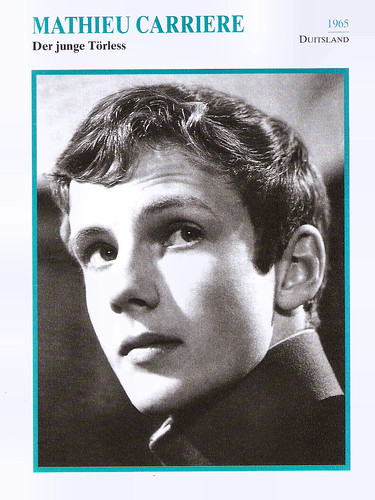
Dutch collectors card in the series 'Filmsterren: een portret' by Edito Service, 1995. Photo: Collection La Cinémathèque Française. Publicity still for Der junge Törless/Young Törless (Volker Schlöndorf, 1966).
An arthouse hit
Mathieu Carrière played the leading role in the French-Italian-West German science fiction-drama L'Homme au cerveau greffé/Man with the Transplanted Brain (Jacques Doniol-Valcroze, 1971), the Belgian fantasy-horror Malpertuis/The Legend of Doom House (Harry Kümel, 1971) with Orson Welles, and the French-Belgian drama Rendez-vous à Bray/Rendezvous at Bray (André Delvaux, 1971), starring Anna Karina.
After this impressive start in France, his career seemed to go nowhere when he appeared in one of the final Brigitte Bardot films, the flop Don Juan ou Si Don Juan était une femme.../Don Juan, or If Don Juan Were a Woman (Roger Vadim, 1973), and in another Vadim debacle, La jeune fille assassinée/Charlotte or The Murdered Young Girl (Roger Vadim, 1974) with Sirpa Lane as a nymphomaniac.
In between, he had a supporting part in the interesting Italian film Giordano Bruno (Giuliano Montaldo, 1973), about the last years of the philosopher Giordano Bruno (Gian Maria Volonté) from 1592 to his execution in 1600.
An arthouse hit was the French drama India Song (Marguerite Duras, 1975), with Delphine Seyrig. India Song was nominated for three César Awards in 1976. Other known films with Carrière were the French crime-thriller Police Python 357/The Case Against Ferro (Alain Corneau, 1976) starring Yves Montand and Simone Signoret, and the West German film Der Fangschuß/Coup de Grâce (Volker Schlöndorff, 1976) adapted from the novel by Marguerite Yourcenar.
He also appeared in the French romantic drama Bilitis (1977) directed by photographer David Hamilton and shot in his well-known soft-focus style. Other films were the Swiss drama Les Indiens sont encore loin/The Indians Are Still Far Away (Patricia Moraz, 1977) with Isabelle Huppert, and the Belgian-French drama Een vrouw tussen hond en wolf/Woman Between Wolf and Dog (André Delvaux, 1979) with Marie-Christine Barrault and Rutger Hauer.
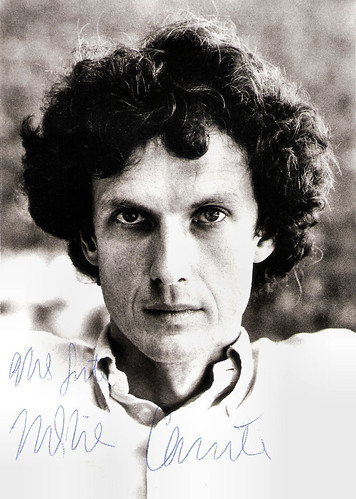
German postcard by Virginia Schmidt, Hamburg, ca. 1982. Photo: Virginia.
The final film of Romy Schneider
In 1980, Mathieu Carrière starred in Egon Schiele – Exzess und Bestrafung/Egon Schiele – Excess and Punishment (Herbert Vessely, 1981), based on the life of the Austrian Expressionist painter.
He then played a supporting part in the French film La femme de l'aviateur/The Aviator's Wife (1981), written and directed by Éric Rohmer. Like many of Rohmer’s films, it deals with the ever-evolving love lives of a group of young Parisians. This was the first in Rohmer's Comedies & Proverbs series.
He then appeared in the final film of Romy Schneider, La passante du Sans-Souci/The Passerby (Jacques Rouffio, 1982), based on a novel by Joseph Kessel. He followed it with the Belgian-French-Italian romantic drama Benvenuta (André Delvaux, 1983), with Fanny Ardant and Vittorio Gassman.
He returned to Germany to play in Die flambierte Frau/A Woman in Flames (Robert van Ackeren, 1983), starring Gudrun Landgrebe. The film was an enormous moneymaker in Germany. Again with Landgrebe and with his sister Mareike, he appeared in the Hungarian drama Yerma (Imre Gyöngyössy, Barna Kabay, 1984), based on the play by Federico García Lorca.
His later films include the Marguerite Yourcenar adaptation L'Œuvre au noir/The Abyss (André Delvaux, 1988), with Gian Maria Volonté and Samy Frey, and the West-German drama Zugzwang/Fool's Mate (1989), which he also wrote and directed.
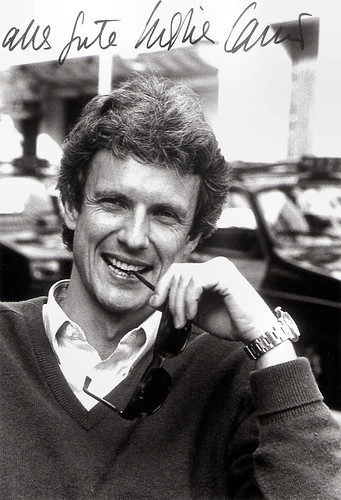
German autograph card.
Symbolically crucified in front of the German Ministery of Justice
During the following decades Mathieu Carrière started to work more and more for television, but there were still several film roles. In 1991, he appeared opposite Isabelle Huppert in the German-Austrian drama Malina (Werner Schroeter, 1991). The screenplay was adapted by Elfriede Jelinek from Ingeborg Bachmann's novel Malina.
It was followed by a part opposite Bruno Ganz in the German drama Erfolg/Success (Franz Seitz Jr., 1991) based on the famous novel by Lion Feuchtwanger. His first American production was the historical adventure film Christopher Columbus: The Discovery (John Glen, 1992) with Marlon Brando, followed by the American World War II drama Shining Through (David Seltzer, 1992), starring Michael Douglas and Melanie Griffith.
He returned to Germany to co-star with Nina Hoss in Das Mädchen Rosemarie/A Girl Called Rose Marie (Bernd Eichinger, 1997), a remake of the highly-regarded film Das Maedchen Rosemarie/Rosemary (1958). This fact-based drama follows the rise and fall of a German beauty who went from ex-convict to courtesan of some of Germany's most powerful men to the victim of an unsolved murder.
Later films include the biopic Luther (Eric Till & Marc Canosa, 2003) starring Joseph Fiennes, the French crime-adventure film Arsène Lupin (Jean-Paul Salomé, 2004), based on the iconic series of novels about gentleman thief Arsène Lupin created by Maurice Leblanc, and the French thriller La marque des anges – Miserere/The Mark of the Angels – Miserere (Sylvain White, 2013), starring Gérard Depardieu. Despite a large budget, the latter film was poorly received by critics and failed to make an impact at the box office.
Mathieu Carrière has two daughters, Alice Isabelle (1985) with Jennifer Bartlett; and Elena Carriere (1996) with Bettina Catharina Proske. After losing a legal battle over custody of his daughter, he became a strong activist for the rights of fathers. In a controversial performance, he was symbolically crucified in front of the German Ministry of Justice in 2006.
German trailer Trailer Der junge Törless/Young Törless (Volker Schlöndorff, 1966). Source: Olga Kuzemko (YouTube).
Trailer for Arsène Lupin (Jean-Paul Salomé, 2004). Source: ClaraGmiki (YouTube).
Sources: AllMovie, Wikipedia (English and German), and IMDb.
This post was last updated on 6 September 2023.
No comments:
Post a Comment